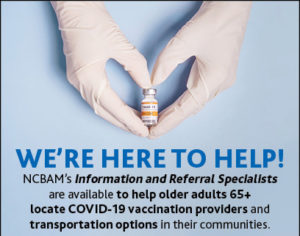NCBAM Helps Older Adults Locate Vaccine Providers
NCBAM Helps Older Adults Locate Vaccine Providers
Information and Referral Specialists at North Carolina Baptist Aging Ministry’s (NCBAM) Call Center are available to help older adults 65+ locate COVID-19 vaccination providers, transportation assistance, and other community resources related to the pandemic. The NCBAM Call Center is open Monday through Friday, 9:00 am – 5:00 pm (877.506.2226).
Call Center Director Melanie Beeson explains, “The state does a good job of linking all its programs and resources on the Internet. But many older adults don’t own computers or they are not skilled at navigating the web. We help by accessing the regularly updated resources provided by North Carolina’s Department of Health and Human Services as well as other state programs that may be available in certain communities.” For example, in addition to assisting callers locate vaccination providers and transportation assistance, NCBAM Call Center staff can advise callers how to connect with the state’s COVID Support Services Program which is currently available in 29 counties to help people successfully quarantine.
NCBAM’s Call Center also reaches out to Baptist churches to help with special needs in their communities. Recently, a 79-year-old Boone resident phoned the Call Center. Beeson explains, “His driveway was covered in snow the day before his vaccination appointment. We can’t always find volunteers so quickly, but thankfully, an ASU student was able to clear the driveway and the man got his vaccination. We were all very grateful, and so was the caller. His wife made cookies for the student as thanks.”
NCBAM’s director, Dr. Sandy C. Gregory, maintains strong partnerships with North Carolina’s Aging Services Network. Says Gregory, “More than a million North Carolinians are at highest risk for complications and death from COVID-19. Now more than ever, NCBAM wants to do everything possible to assist in meeting their needs and obtaining vaccinations.”

